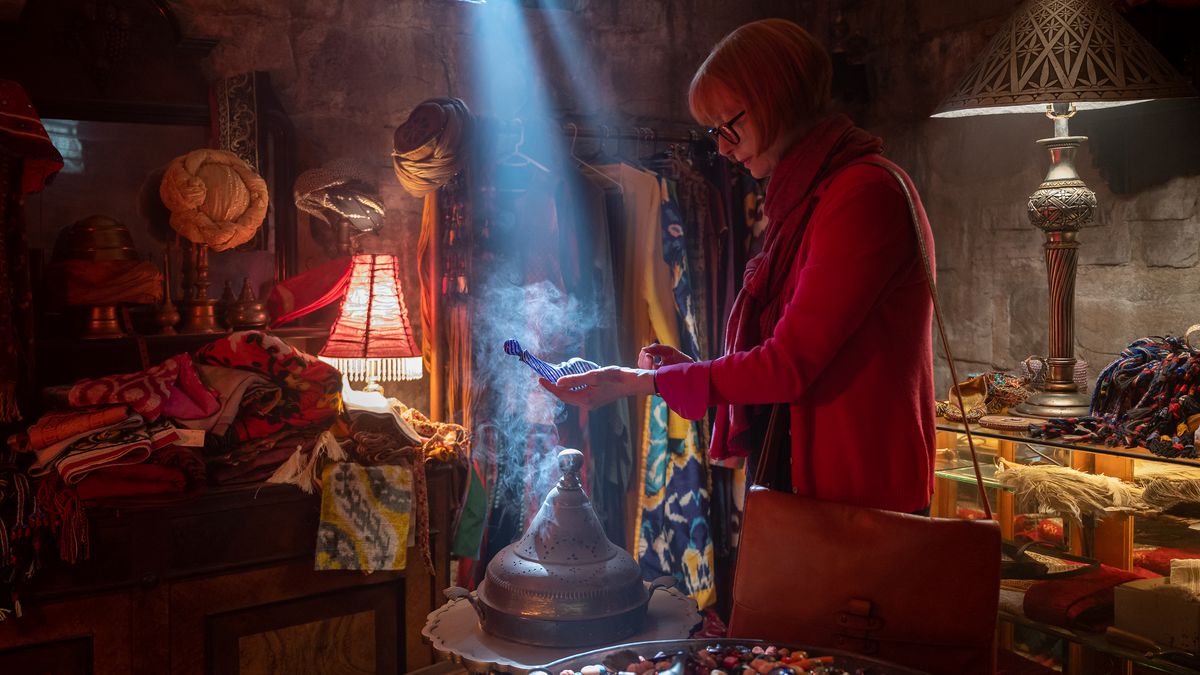

The career of director George Miller has been idiosyncratic to say the least. The Aussie director came to fame on the back of his Mad Max trilogy, a violent, post-apocalyptic action series. Miller has gone on to make family films, animation, and more. He has also had long gaps between his films. Now along comes Three Thousand Years of Longing, a work that Miller has apparently been attempting to adapt since the 90s. Centered on Tilda Swinton as a professor of narrative, she finds a bottle containing a genie, played by sultry Idris Elba, who promises her three wishes in exchange for his freedom. Unsure that she wants anything, and doubtful of the genie’s intentions based on her knowledge that all wish stories are cautionary tales, she is reluctant to wish until the Genie begins to regale her with his tale.
As one might expect, the film is, in part, a commentary on the nature of storytelling. It explores why we tell them, what they can mean for us, and whether or not some are dependent on stories in modern society. The simple premise of the film is inciting. Most of the film is Swinton and Elba exchanging banter in a hotel room, dressed in fantastically cozy-looking white bathrobes, with Elba oozing charisma and Swinton giving just the right touch of curious and cautious to sell her character. The pair have a palpable chemistry together, and this makes chunks of the film enjoyable.
The film also delivers a number of showy flashbacks, as the Genie talks of his millennia of trying to unlock the desires of women and attain his freedom, going back to the Queen of Sheba, the concubines of Soliman, and a wife of a merchant burdened with her own scientific genius. These stories do entertain us in their own right, and Miller’s skill as a visual storyteller is unmatched. The film is replete with memorable images, lots of color, and a certain manic energy in the editing that makes you feel like the Genie is indeed luring you in.

Where the film falls short is that the third act veers off into a fairly different direction that the script doesn’t quite earn. This part of the film takes on a bit of a different tone, attempting some bizarre political commentary out of nowhere and trying to complete an arc for Swinton’s character. This doesn’t quite work due to how much of a passive cipher Swinton is throughout chunks of the film. By the time Miller attempts to do something with her character, the time is too late for a truly fulfilling arc.
That said, Miller does more than enough to make Three Thousand Years of Longing a lovely and investing film. Miller is not attempting to please anyone but himself with this one, but it is a wonderfully optimistic and sentimental work. It takes a firm stance that love is worth having, that love can make a life worth living, and that stories demonstrate the worth of love. It’s a film unafraid to dazzle and unafraid of wearing its heart on its sleeve. While more work on the script might have elevated it further, Three Thousand Years of Longing fulfilled my wish for an enjoyable cinematic experience.
Tell us your thoughts below and rank it on Flickchart today!
The post Review: Three Thousand Years of Longing first appeared on Flickchart: The Blog.






